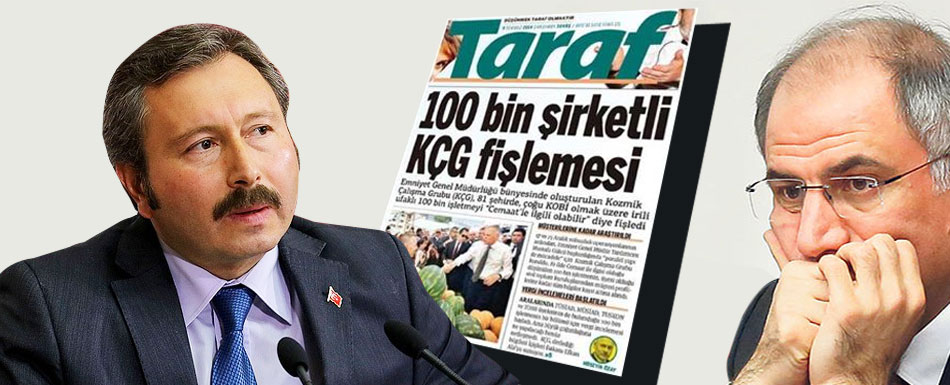Covert unit profiles scores of firms in anti-Hizmet witch hunt

A secretive unit operating under the National Police Department has identified all companies and businessmen affiliated with the Hizmet movement in the 81 provinces of Turkey, profiling some 100,000 firms, the Taraf daily reported on Wednesday.
The unit, which Taraf claimed to be named the Cosmic Study Group (KÇG), a name reminiscent of the West Study Group (BÇG) operating at the time of the Feb. 28, 1997 postmodern coup, was established as part of a government-led operation to stamp out the “parallel structure” within the state.
Prime Minister Recep Tayyip Erdoğan ordered an operation against the Hizmet movement in an effort to extricate himself and his government from damning charges of graft and bribery that emerged from two police operations on Dec. 17 and Dec. 25 of last year. The move aims to deflect the ensuing pressure by painting the Hizmet movement as a proxy of unidentified external powers who envy Turkey's tremendous success and thus seek to oust Erdoğan and handicap Turkey with “false allegations” of corruption.
Inspired by Turkish Islamic scholar Fethullah Gülen's moderate interpretation of Islam and the great importance he attaches to education, the Hizmet movement describes itself as a grassroots movement devoted to spreading interfaith dialogue around the world, with a special emphasis on education. Erdoğan, who uses deliberately divisive rhetoric against the Hizmet movement and Gülen, has said he will pursue “a witch hunt if necessary” against all members of the Hizmet movement, during a much-debated tirade.
The KÇG has allegedly categorized companies and businessmen in a variety of ways, from their membership in business organizations to the profiles of their customers. Taraf said it had not been able to deduce why this profiling had been carried out or in what way the information stored in the KÇG archives might be utilized. However, Taraf claimed that the Finance Ministry's recent inspections into companies known to be close to the Hizmet movement may have been conducted as an implementation of this data.
Kütahya independent deputy İdris Bal brought the KÇG claims to the parliamentary agenda with a question for Interior Minister Efkan Ala. He asked if the claims that the establishment of the “illegal KÇG” were true and if Gülcü had presided over this secretive group. He asked if the KÇG was a new form of the BÇG and if it would monitor and profile the followers of the Hizmet movement.
Asked about the KÇG allegations on Wednesday in Ankara, Turkish Industrialists and Businessmen's Association (TÜSİAD) President Haluk Dinçer said it is too early for him to comment. “I have to first confirm the authencity of these news before making a comment,” he told the reporters.
The Turkish media revealed in the last couple of weeks that the Ankara Chief Public Prosecutor's Office launched an operation against the Hizmet movement on instructions from Erdoğan, and the National Police Department's Counterterrorism Department developed an action plan accordingly. Taraf reported in its story that KÇG was created inside the National Police Department as a special team to conduct this operation. The KÇG is structured into three sub-branches. One of these is responsible for tracking businesses close to the Hizmet movement, while the second keeps tabs on its educational activities. This branch works in cooperation with the Education Ministry and Finance Ministry and is tasked with making surprise inspections of educational institutions and trying to obstruct their operations. Taraf said these inspections would continue even during the summer vacation, when schools are closed, and will aim to impose heavy fines, putting these institutions under financial pressure and forcing them to close. The third branch is entrusted with identifying members of the Hizmet movement in the bureaucracy.
No court order
The KÇG has collected information about these companies from the Finance Ministry, the Ministry of Labor and Social Security and the Treasury Undersecretariat, as well as the Financial Crimes Investigation Board (MASAK) and the Banking Regulation and Supervision Agency (BDDK), Taraf said. Adding insult to injury, the KÇG did not seek a court order to procure confidential information about private companies and individuals. Relying on the data it collected from state sources, the KÇG created profiles for these companies including such information as the names of primary customers, the foundations they donate to, their trade volume, the taxes they pay and more.
Echelons of KÇG
This special team assigned to lay siege to the Hizmet movement from all sides and help the government deal a death blow to the movement comprises the top ranks of internal security units, including the National Police Department's Intelligence Agency, the Anti-Smuggling and Organized Crime Bureau and the Counterterrorism Department, along with a number of police chiefs in Ankara, Taraf said. According to the daily, the unit is headed by National Police Department Deputy Chief Mustafa Gülcü, who was appointed to his post in one of the massive waves of purges and reassignments that aimed to minimize the consequences of the Dec. 17 probe.
Kütahya independent deputy İdris Bal brought the KÇG claims to the parliamentary agenda with a question for Interior Minister Efkan Ala. He asked if the claims that the establishment of the “illegal KÇG” were true and if Gülcü had presided over this secretive group. He asked if the KÇG was a new form of the BÇG and if it would monitor and profile the followers of the Hizmet movement.
- Created on .
